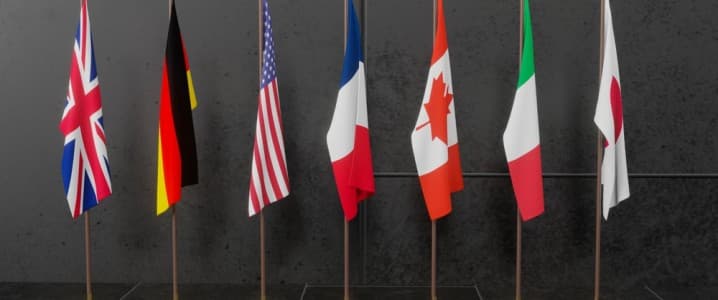The G7 Could Finalize Plans For A Price Cap On Russian Oil Today

G7 finance ministers are set to finalize a plan on a potential price cap on Russian oil.
Despite Russia’s falling oil export volumes, revenues in June increased by $700m from May due to prices pushed higher by its war in Ukraine.
The Kremlin has since warned it will not tolerate any restrictions to prices, and Gazprom would instead only ship oil to states not obeying the price ceiling.
Plans to impose an energy price cap on Russian oil are expected to be firmed up by G7 finance ministers when they meet later today.
The G7 wants to slash revenues funding Russia’s invasion of Ukraine while maintaining its sanctions on supplies without causing price spikes.
Oil peaked at a 14-year high of $139 per barrel in March, and has remained historically elevated since then – only dropping back below the $100 milestone last month.
It has proposed limiting the per-barrel level of the price cap, above which complying countries would refuse insurance and finance to Russian crude and oil product cargoes.
Finance Minister Nadhim Zahawi has discussed the prospect of a cap with US Treasury Secretary Janet Yellen.
He was hopeful that G7 finance ministers will “have a statement that will mean that we can move forward at pace to deliver this.”
Speaking in Washington, he said: “We want to get this oil price cap over the line.”
Despite Russia’s falling oil export volumes, revenues in June increased by $700m from May due to prices pushed higher by its war in Ukraine, the International Energy Agency revealed last month.
Western leaders agreed in June to explore to a cap to limit how much refiners and traders can pay for Russian crude.
The Kremlin has since warned it will not tolerate any restrictions to prices, and Gazprom would instead only ship oil to states not obeying the price ceiling.
The G7 consists of Britain, Canada, France, Germany, Italy, Japan and the US.
It is unclear whether China or India, two of the world’s biggest oil consumers, would be prepared to participate in the cap.
It would also depend heavily on denying London-brokered shipping insurance, which covers about 95 per cent of the world’s tanker fleet, and finance to cargoes priced above the cap.
Russian oil prices have risen in anticipation of the EU embargo, with Urals crude trading at an $18-25 per barrel discount to benchmark Brent crude, down from a $30-40 discount earlier this year,




